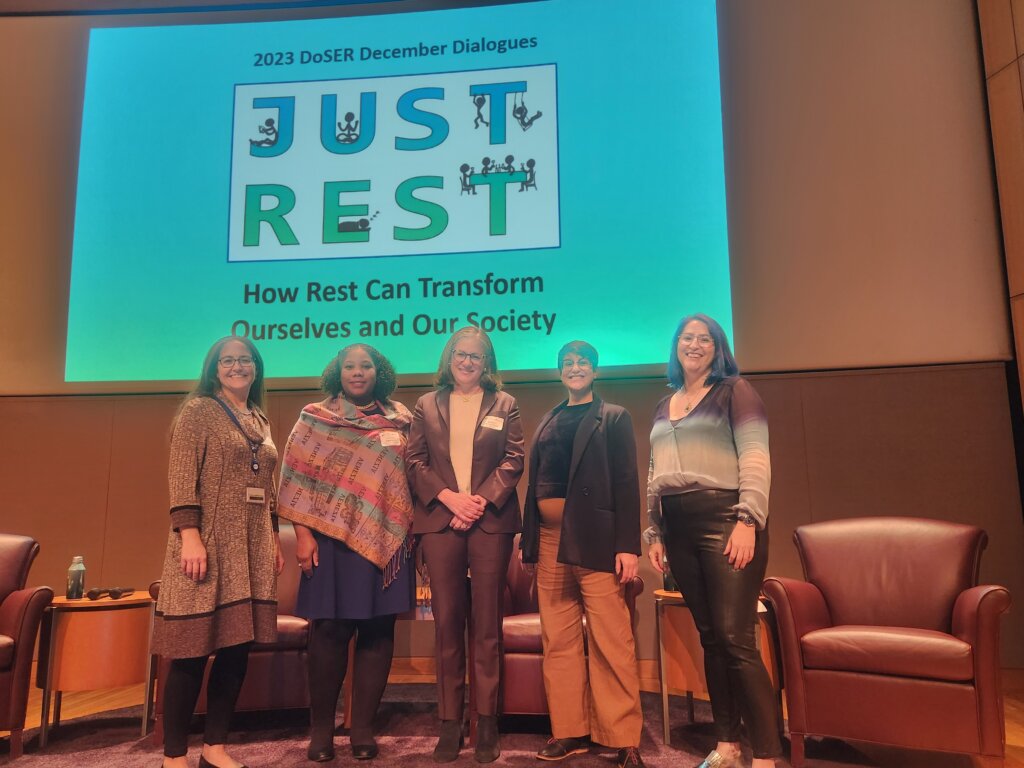This is a reposted article from the AAAS News, written by Andrea Korte; read the original here.

From left, DoSER Program Director Katy Hinman, Dayna Johnson, Judith Shulevitz, Dom Chatterjee and moderator Rachel Kline | DoSER
Sleep and rest are essential to our physical, mental and spiritual health, according to the panelists at an event hosted by AAAS’ Dialogue on Science, Ethics and Religion (DoSER) program. Yet the beneficial impacts of sleep and rest are not always attainable.
The panelists spoke Dec. 13 at AAAS headquarters in Washington, D.C., as part of DoSER’s annual December Dialogues, which aim to create a space for conversations on a subject at the intersection of science, religion and society. The event, “Just Rest: How Rest Can Transform Ourselves and Our Society,” brought together a sleep epidemiologist, a cultural critic and a community organizer for a wide-ranging discussion on the importance of sleep and rest – and how to improve access for all to its restorative powers.
THE DIMENSIONS OF SLEEP AND REST
“Sleep is vital to our survival,” said Dr. Dayna Johnson, assistant professor at Rollins School of Public Health, Emory University.
When we sleep, our memories are consolidated. Sleep boosts the immune system – people who sleep longer are at a lower risk of catching a cold. It’s linked to our metabolism and our cardiovascular regulation.
The consequences of lost sleep can be dire: 20 percent of serious motor vehicle crashes can be attributed to sleep disorders, Johnson said.
Yet it is not simply sleep that is important, the panelists noted. The need for rest more generally is also essential to our well-being.
There are many ways to rest, and we may benefit from different types of rest at different times, said Dom Chatterjee, a community organizer, seminary student, yoga teacher and founder of Rest for Resistance and co-founder of QTPoC Meditation, both of which create healing resources by and for queer and trans people of color. Rest, Chatterjee said, can look like relaxing on the couch, but it can also mean being able to feel relief from mental distress by knowing that others are sharing the burden.
“The reality of activism is there’s a lot of people who lose sleep in order to increase awareness and action around social injustices,” they said. “How do we take turns showing up for each other and not leave somebody there when they haven’t had a day off in weeks?”
While we might trade off periods of work and rest with others, writer and cultural critic Judith Shulevitz noted that it is important to preserve shared time and space for rest and restoration.
Her book, “The Sabbath World: Glimpses of a Different Order of Time,” grew out of a realization that people’s schedules were becoming “desynchronized” from those of their loved ones.
“We were no longer working at the same time, and we were no longer playing at the same time, and we were no longer resting at the same time,” said Shulevitz. “I had a hunch that this was not only unpleasant as a family when you can’t coordinate your schedule, but it was bad for us as a society.”
WHO GETS TO REST?
Another key challenge surrounding sleep and rest that all three speakers touched upon: not everyone gets enough.
“Sleep is not equitable,” said Johnson. Historically minoritized people are more likely to have sleep difficulties and sleep disorders, she said, spurred in part by a greater likelihood of living in an environment not conducive to restful sleep. Reduced access to care and a greater burden of psychosocial stress also play a part, Johnson said.
Chatterjee echoed this, noting that multiply marginalized people, who are often already overworked or working underpaid jobs without fixed schedules, are also occupied with the mental work of holding space for suffering.
“I’m trying to physically relax, but mentally, the wheels are turning,” they said.
Shulevitz noted that lower-income people and minorities are more likely to be dealing with the impacts of desynchronized schedules, as they are more likely to be working jobs without fixed schedules.
“You’re required to sign something saying that you will be willing to work weekends or overtime – and be willing to do it on a moment’s notice,” she said.
HOW TO IMPROVE SLEEP AND REST
All three speakers discussed how they improve the quantity and quality of their sleep and rest.
As an expert on sleep, Johnson gave advice for improving sleep hygiene: go to bed and wake up at the same time each day, even on days off work, and keep the bedroom dark, quiet, cool and free of electronics.
For Shulevitz, delineating a separation between work and rest has been valuable. She cited the ceremony marking the end of the Jewish Sabbath: lighting a candle, drinking wine, smelling spices and thanking God for making a division between day and night, “between holy and secular,” she said.
“I love these distinctions,” Shulevitz said.
For Chatterjee, mindset and mindfulness can make a difference for activities that may not be otherwise restful. For example, cooking can be either a chore or a meditative experience, depending on their mindset.
“This is the same activity, but my internal relationship to the activity actually determines how much of an energy drain it is,” Chatterjee said.
By changing their mindset, “maybe I’ll feel nourished not just by the food that I’m cooking, but by the process,” they said.
All three panelists, however, emphasized that maximizing rest is not simply an individual process but depends upon structural factors and societal changes.
Panelists called for work hour limits, greater unionizing of the subcontractors who power the gig economy and a minimum wage that is truly a livable wage – policies that would allow people to reclaim time to ensure ample rest.
Said Shulevitz, “We need society and communities to help set boundaries, and we also need within that some ability for individuals to self-determine what is truly restful for them.”




